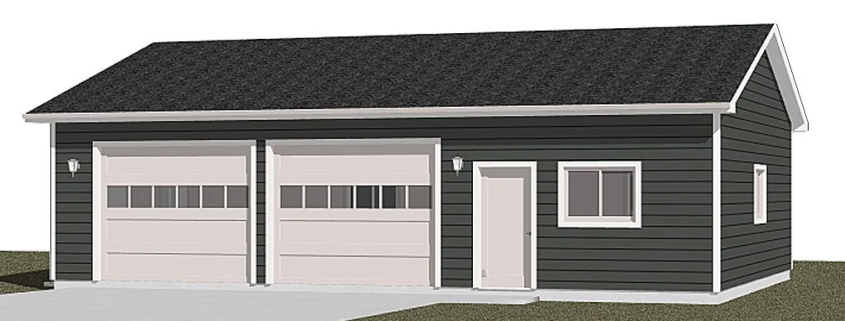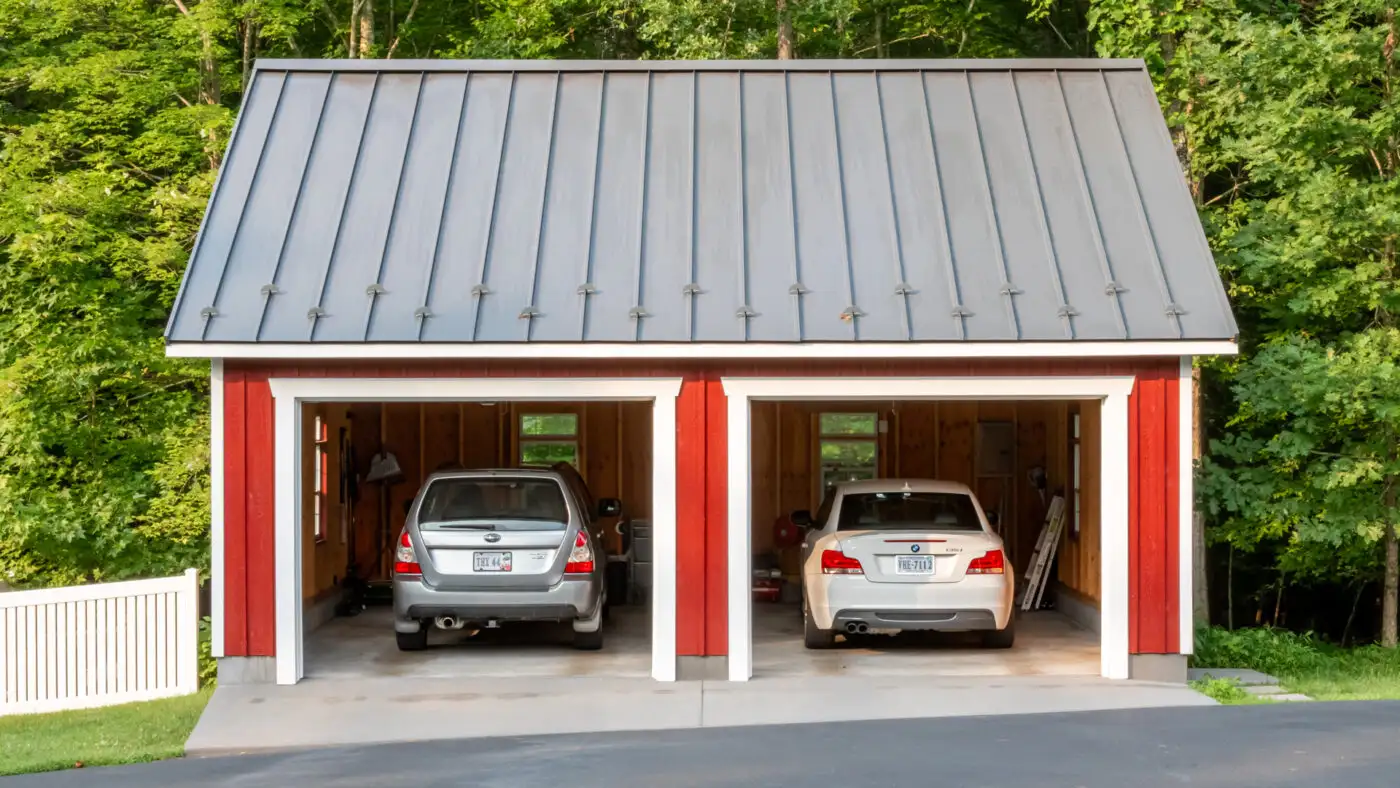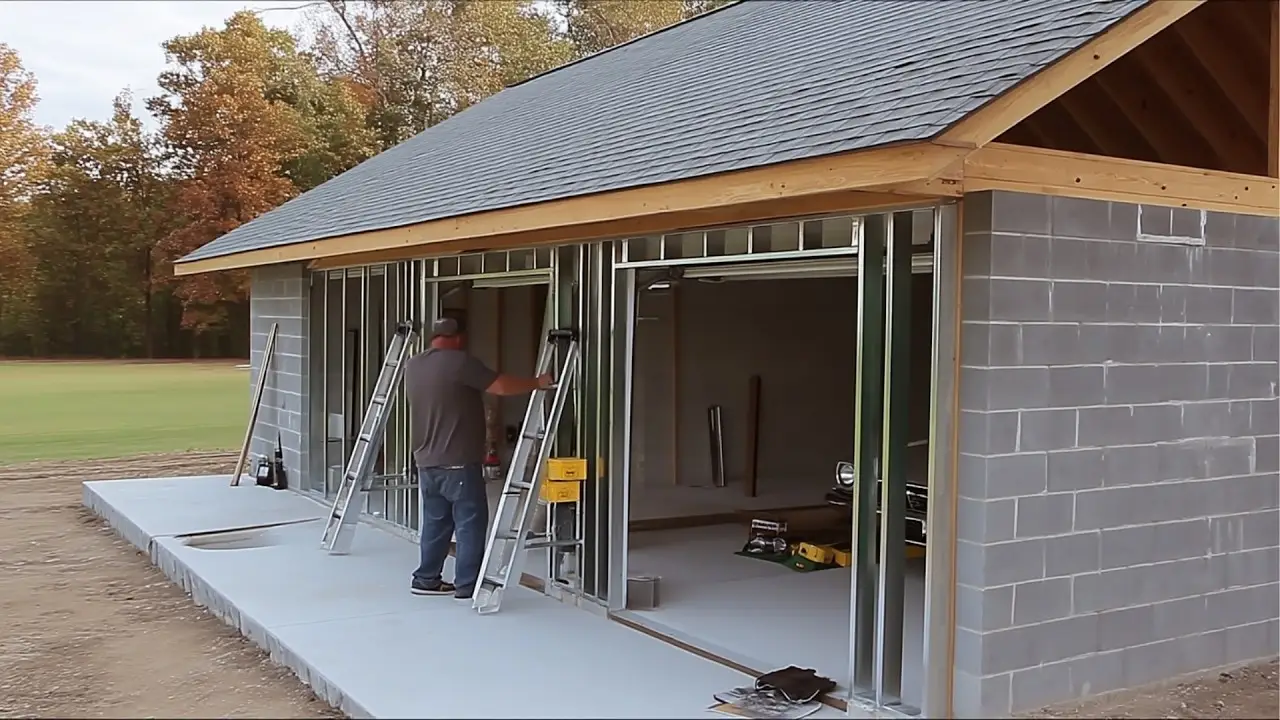How Much Does It Cost to Build a Two-Car Garage in 2025?
Thinking about a two-car garage build? Initiate by understanding cost breakdowns for this project so you can save maximum when it comes to money and time.
Key Assumptions & Scope
Before going into the depth of a two-car garage estimate, understand some basic concepts and the factors affecting the project cost.
| Parameter | Assumption / Standard | Notes / Variation |
| Size (footprint) | 20 × 20 toes (four hundred ft²) as much as 24 × 24 feet (576 ft²) | Many garages fall in this range; large garages fee more per ft² |
| Height & Roof | Standard 8‐10 ft sidewalls, traditional gable roof | Taller ceilings, vaulted, or complicated rooflines add cost. |
| Structure Type / Frame | Wood stick frame (or steel hybrid) | Solid, conventional approach |
| Slab & Foundation | Typical poured concrete slab at grade, with a thickness of 4 to 6 inches. | Remediating the soil, installing deeper footings, and including frost safety may want to raise the overall price.
|
| Exterior Finishes | Standard siding (vinyl, wood, fiber cement), asphalt shingle roof | Brick, stone, and premium roofing increase cost |
| Doors / Openings | One double garage door (16 ft extensive), a side access door, and windows | Upgrades (carriage style, insulated doors) cost more |
| Utilities / Interior Work | Simple electrical wiring for lighting and shops; excludes HVAC, plumbing, and complete painting. | Extra wiring, insulation, drywall, and HVAC will add considerably. |
| Permits / Soft Costs | Local allows fees, plan assessment, and probably utility website connections. | These range widely across the town/county. |
Note: When we say “cost” in this text, we intend to consist of substances + exertions + fashionable subcontractor work + permit/soft expenses until otherwise noted.
National Averages & Industry Benchmarks (2025)
To set practical expectations, here are numerous industry assets and benchmarks for two‑car garage charges in 2025:
- At $35–$60 in line with square foot, a 400–576 ft² place works out to a fee ranging from $19,600 to $28,200.
- A widespread two‑vehicle garage typically runs between $14,500 and $40,300, depending on the chosen options.
- An excessive-give-up ‑vehicle garage can cost as much as $53,788, with an average price near $31,724.
- A two‑car garage normally falls inside the $15,000‑$40,000 range, relying on its length and the exception of the end.
- Typically, the rate spans roughly $25,000 to $60,000, depending on the materials used, the extent of finish, and the area.
In excessively priced markets, a top‑tier or absolutely finished version can reach $50,000 or more.
Therefore, when preparing your own estimate, it’s prudent to bracket a low/base/excessive case state of affairs.
Cost Breakdown by Component
Generating an accurate estimate is less difficult, while you may see how each important detail contributes. Below is a precise desk that outlines approximate cost splits (possibilities) together with sample greenback amounts for a regular mid‑range task (e.g., about 500 ft² in a mean place).
Read More: Foundation Repair Cost in 2025: Affordable Solutions for Homeowners
| Component | Typical Share of Total Cost | Sample Dollar Range (for $30,000 build) | Notes / Key Cost Drivers |
| Foundation & Slab | 10 – 15% | $3,000 – $4,500 | Soil prep, reinforcement, slab thickness, access |
| Framing / Structural & Roof | 20 – 25% | $6,000 – $7,500 | Lumber/steel, trusses, roof sheathing |
| Roofing & Exterior | 10 – 15% | $3,000 – $4,500 | Shingles, flashing, siding, trim |
| Doors & Openings | 5 – 10% | $1,500 – $3,000 | Garage door, side door, windows |
| Exterior Finishes / Siding / Trim | 5 – 10% | $1,500 – $3,000 | Cladding, fascia, soffits |
| Electrical / Lighting / Outlets | 3 – 7% | $900 – $2,100 | Basic wiring, outlets, lights, more if heavy circuits |
| Insulation / Drywall / Interior | 5 – 10% | $1,500 – $3,000 | If you finish the interior walls |
| Permits, Soft Costs, Design | 5 – 10% | $1,500 – $3,000 | Engineering, design, inspection, and permit fees |
| Labor (all trades) | ~30 – 40% | $9,000 – $12,000 | Includes all labor portions (carpentry, electrical, etc.) |
| Miscellaneous / Contingency | ~5% | $1,500 | Waste, unknowns, minor extras |
Notes:
- Labor regularly makes up 50–70% of the total cost in many construction projects. (Industry standard)
- Carpentry alone may be ~27% of the challenge price in some builds.
- The price of roofing and siding is basically pushed by means of the material selected (including asphalt shingles, metal, or top-class tile).
- A 16 ft two-car garage door typically costs between $1,575 and $3,150, including installation.
- For lights, wiring, and panel connections, in all likelihood $1,050 to $2,625 for a standard two-car garage.
Regional/Local Variations & Adjustment Factors
One of the most important sources of fee variance is in which you build. Labor, resources, allows, and location accessibility range markedly across states, metropolitan areas, or even man or woman ZIP codes.
Key Regional Adjustment Factors
| Factor | Impact | Suggestion |
| Labor Rates | High in coastal, urban, high-cost states (e.g., CA, NY, WA) | Multiply base cost by a regional index (e.g., +20–30%) |
| Material Delivery & Transport | Remote or hard-access sites increase freight cost | Include an extra per cent or per-mile cost |
| Soil / Geotechnical Conditions | Subpar soil, rock, steep grades, and water‑table issues all increase foundation costs. | Request a soil survey or geotechnical analysis |
| Permit & Impact Fees | Cities can impose steep fees for permits, impact assessments, sewer services, and water usage. | Research local municipal fees |
| Weather / Climate | The presence of snow loads, wind loads, and flood zones calls for a more robust structure. | Structural upgrades increase cost |
| Local Code Complexity / Inspections | More inspections or code complexity (seismic, hurricane zones) add cost | Add a 5–10% buffer in such regions |
Sample Regional Adjustments
Assume the bottom price estimate, without any regional adjustments, is $30,000.
- In a steeply-priced metro (e.g., Los Angeles, San Francisco, NYC): +25% ≈ $37,500.
- In a mid‑priced market (e.g., Dallas or Phoenix), the base profits plus as much as a 10% growth total approximately $33,000.
- In rural / decrease price area (Midwest, South interior): base or even –5% → ~$28,500
Including this nearby multiplier is essential to making the estimate practical.
Read More: How Much Does a Foundation Cost Per Square Foot?
Attached vs Detached Garages: Which Costs More?
Whether your garage is attached to a house or detached, it will affect cost in several ways:
| Feature | Attached Garage | Detached Garage |
| Shared wall/utilities | One fewer outdoors wall, less complicated, to get permits to current utilities. | Must construct complete walls, run new utilities |
| Foundation complexity | May tie into the home basis | Separate basis/footings |
| Building in the current footprint | Easier site access, potentially lower site prep | May require additional grading, driveway, and application strains |
| Permitting / layout integration | Possibly less difficult code integration | May need a separate site plan, setback compliance |
Typical difference:
Detached garages typically run about 10‑20% higher than comparable attached ones, in particular, whilst utilities need to be set up or the site is far away. A stand‑alone car garage commonly begins in the $30,000‑$60,000 range, as opposed to more or less $25,000‑$50,000 for an attached unit.
Attached garages can cost less per ft², thanks to utility and wall financial savings.
In summary: If your site permits a connected build, it will be money-saving; however best if the utility gets access and structural integration is simple.
Finish Levels & Optional Add-Ons That Shift Costs
Beyond the structural “shell” of the garage, selections on finishes and extras regularly cause the most significant cost swings. Here are commonplace add-ons and how much they generally add:
| Add-On / Feature | Typical Cost Increase or Range | Notes |
| Insulation & drywall | $1.50 – $6+ per ft² | Depends on R-value, wall height, and drywall finish |
| HVAC, heating, or ventilation | $1,500 – $8,000+ | HVAC wiring, ductwork, mini-split, heater, etc. |
| Plumbing/bathroom/sink | $500 – $3,000+ | If you run water lines or drainage |
| Upgraded floor (epoxy, polished, specialty coating) | $3 to $10+ per ft² | Many garages use bare concrete; coatings add cost |
| Premium garage doors or multiple doors | $2,000 – $5,000+ | Carriage style, insulated doors, and additional doors |
| Windows, skylights, extra access doors | $300 – $2,100 each | Depends on size and material (vinyl, fiberglass, wood) |
| Loft/mezzanine/storage platform | $5 to $15 per ft² of mezzanine | Structure, access stairs, guardrails |
| Electrical circuit upgrades | $1,000 – $5,000+ | High load circuits (EV charger, 240V tools), subpanel |
| Lighting, outlets, wiring extras | $500 – $3,000 | Additional lighting, switches, and conduit runs |
| Exterior upgrades (stone veneer, brick, architectural siding) | $5,000 – $20,000+ | Material + labor premium |
A “top-class” two-car garage with some of the foregoing functions can, without difficulty, push total cost into $50,000 to $70,000+ territory in higher cost regions.
Typical Two-Car Garage Cost Ranges by Scenario
To provide the estimates with a clearer image, do not forget those instance eventualities—basic shell, mid‑variety finish, and top class—for a 20 × 22 ft (440 ft²) two-car garage. Assume a standard place (neither ultra‑excessive price nor extremely low).
| Scenario | Typical Cost Range | Key Inclusions & Notes |
| Basic / Shell Only | $18,000 – $25,000 | Slab, framing, roof, siding, single garage door, basic wiring, no insulation or drywall |
| Moderate Finish | $28,000 – $40,000 | Includes insulation, drywall, extra wiring and lighting, nicer siding, and windows |
| High / Premium | $45,000 – $65,000+ | Polished floor, HVAC or heater, upgraded doors, mezzanine or loft, premium exterior materials |
How to Calculate Your Two-Car Garage Cost
You can use this framework and modify it to your specific site, design, and materials by following these steps:
- Select your base scenario (shell, moderate, premium).
- Measure local labor & material cost multipliers (e.g., your area’s cost index).
- Run preliminary quotes on each major component (footing, framing, roofing, etc.)
- Add contingency (5–10%) for unknowns.
- Apply regional adjustments (permits, soil issues, access)
- Generate low / base / high estimates with margin bands.
- Compare with contractor bids — if your internal estimate and their bid differ wildly, examine omitted items.
- Use professional estimating support for final validation.
As a professional Garage estimating service, USA Estimators can help you calibrate those multipliers and check each component’s unit cost — reducing your risk of overruns.
Cost-Saving Strategies
You can save on your two-car garage building using valuable cost-saving points and trade-off guidelines.
- Simplify shape and roofline, minus complex dormers and architectural curves, as they require additional work and more labor, hence increasing project expense.
- Optimize every sq ft of the project. Add area according to your needs and eliminate the extra to control your expenses.
- As this is a garage project, you don’t need to invest in custom doors and windows.
- Pre-order materials and buy in bulk. You can also go for discounts to reduce your two-car garage project.
- Prefer nearby suppliers to reduce transportation costs.
- Do minor tasks yourself (if possible). This will reduce labor expenses.
- Get permits on time to avoid rejection costs and penalties.
Why Use a Professional Estimator?
Many DIYers or contractors ignore estimates from professionals, and later face budget and time overruns. Here are some points showing how working with a certified estimating team changes the game.
- Risk mitigation: They detect missing scope items (soil remediation, unseen utilities, drainage) that you often overlook.
- Accurate unit rates: They use a well-maintained, up-to-date database for region-based data, ensuring accurate estimates.
- Guaranteed precision: They offer cost-accuracy guarantees / insurance-backed estimates (you can mention your own guarantee) to build trust.
- Time savings: No need to get multiple quotes and arrange them; they provide ready-to-execute plans.
- Bid strategy support: Beyond raw numbers, they advise on competitive markup, value engineering, and bid submission.
- Documentation & breakdowns: You get a transparent, line-item estimate you can use to compare contractor bids and avoid change orders later.
- Continuous updates: If material or labor rates fluctuate, they provide revised estimates mid-project.
Considering the complexities of the two-car garage project, hiring an estimator is not an expense; however, it’s a smart investment that will give a return in the long run. If you are thinking about building a two-car garage and looking for a reliable company providing realistic estimates, USA Estimators should be your go-to.
Contact us now to request your custom garage estimate — no obligation, just clarity!
FAQs
What to do if my garage site is sloped, rocky, and has poor soil?
It is a common issue. You can solve them by adding retaining walls, footings, and additional excavation/geotechnical work. Remember that it’s going to add 5% or greater to your two-car garage project.
What if I choose a pre-fabricated or kit solution for my garage mission?
Pre-fabricated or kit solutions normally cost much less, but they exclude hard work, basis, and finishing. On average, the cost ranges between $6,000–$12,000, excluding extras.
How much contingency fund do I need to consider for my two-car garage build?
5-10%. It may be extra in keeping with your 2-car garage task’s particular scope.







